Resume
Devops Engineer Cover Letter Examples

May 29, 2025
|
12 min read
Craft the perfect DevOps engineer cover letter that bridges the gap between your skills and the hiring manager's needs. Learn how you can automate your way to a job by structuring a letter that deploys results.
4.70 Average rating
Rated by 348 people
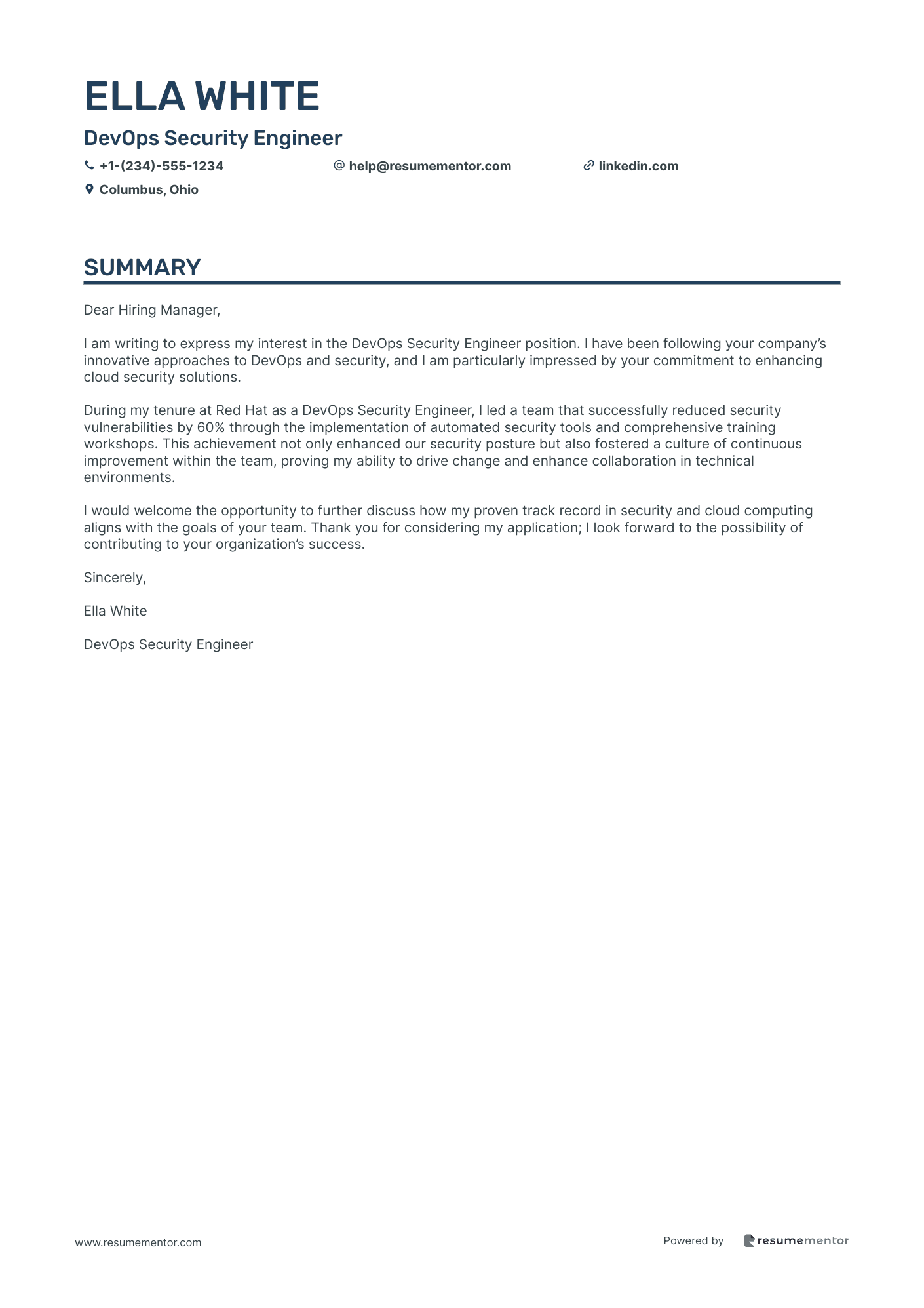
DevOps Security Engineer
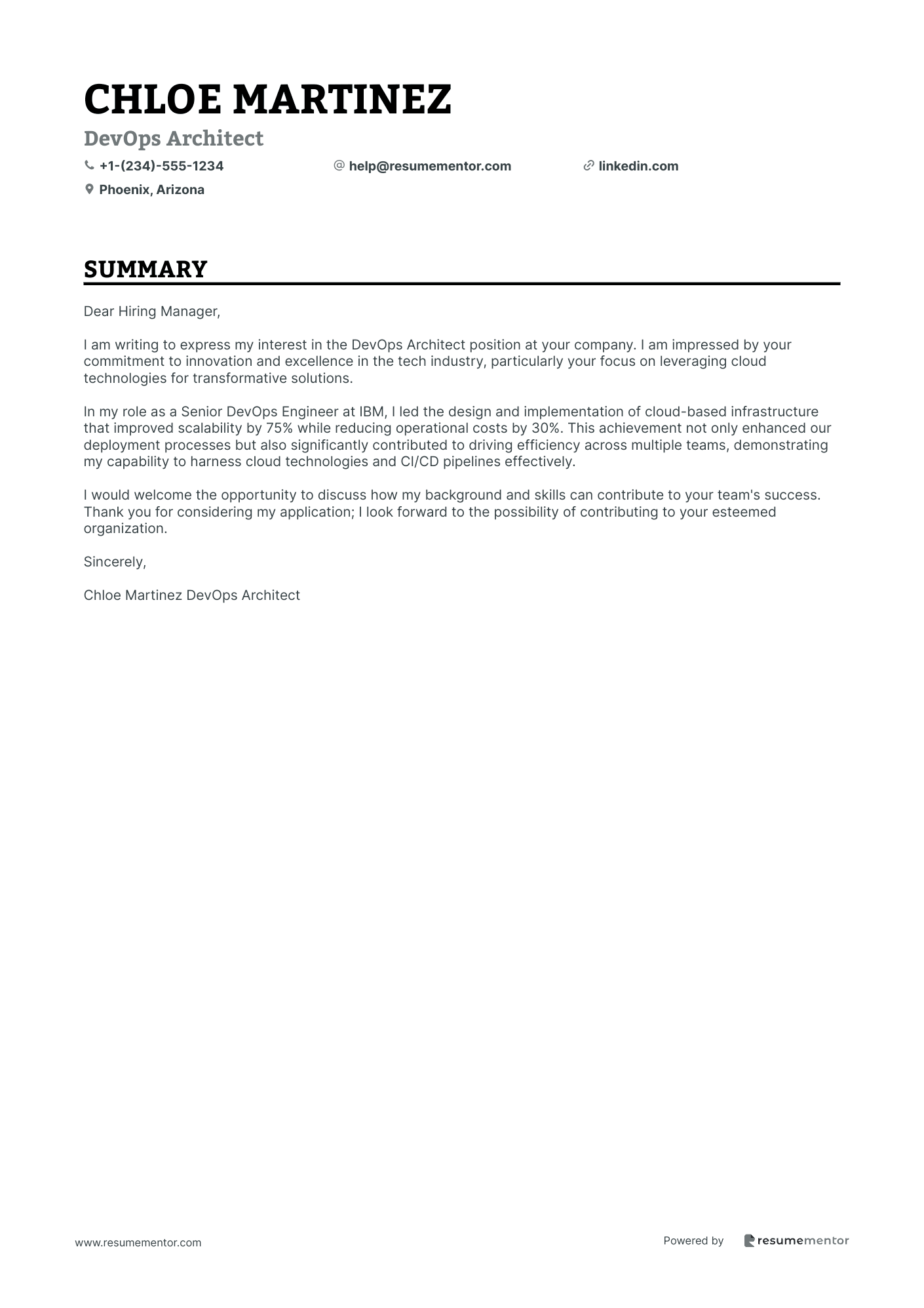
DevOps Architect
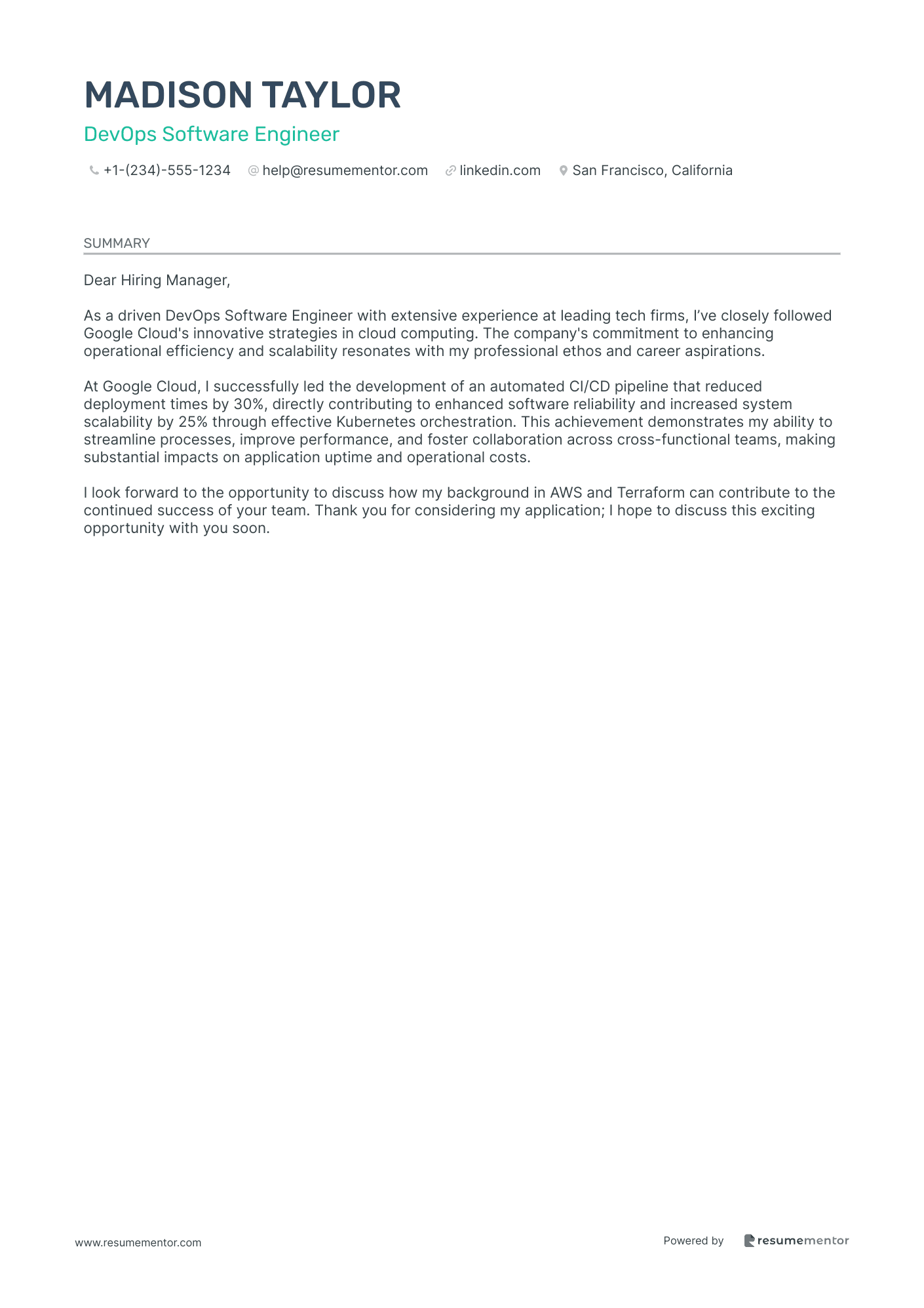
DevOps Software Engineer
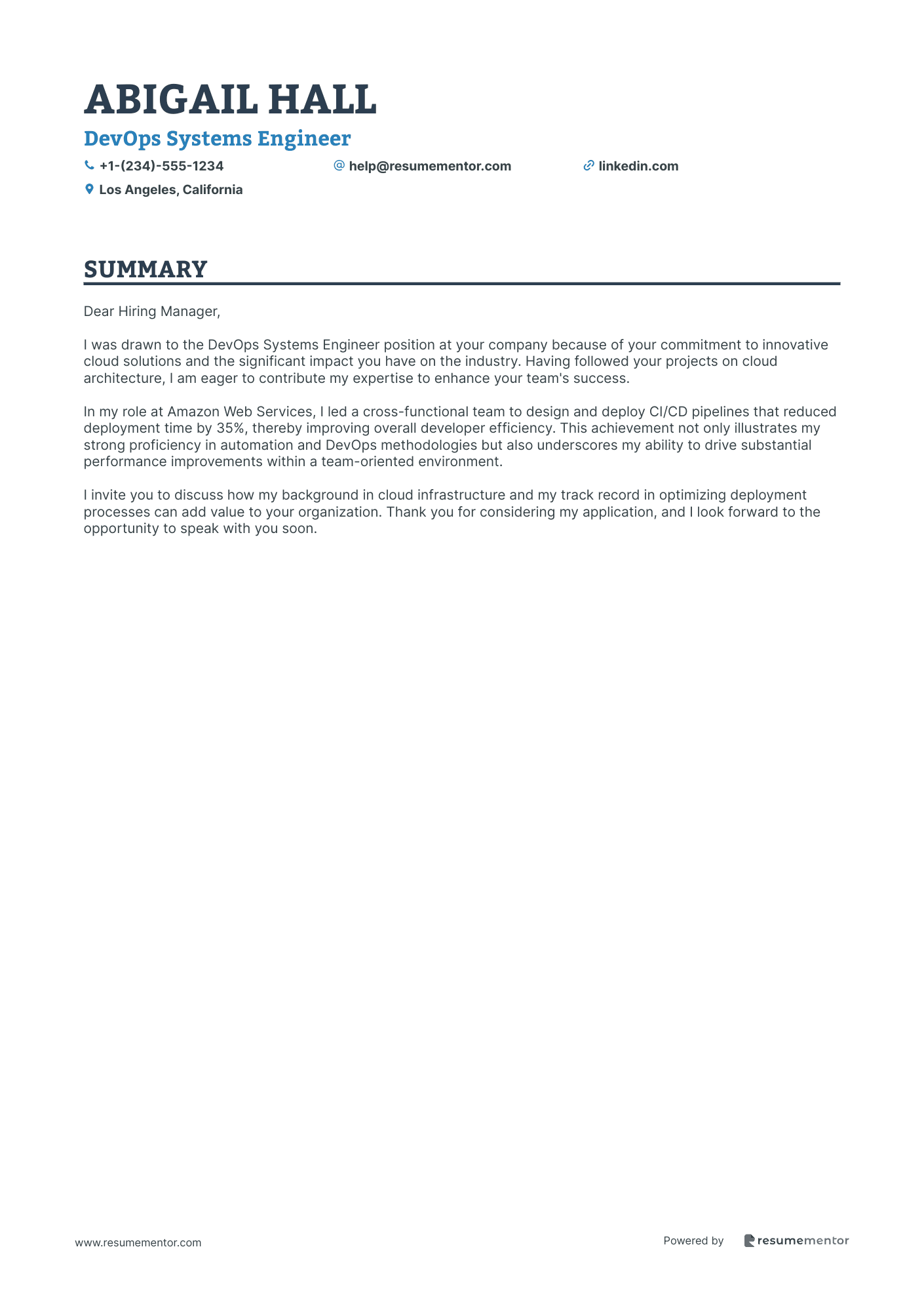
DevOps Systems Engineer
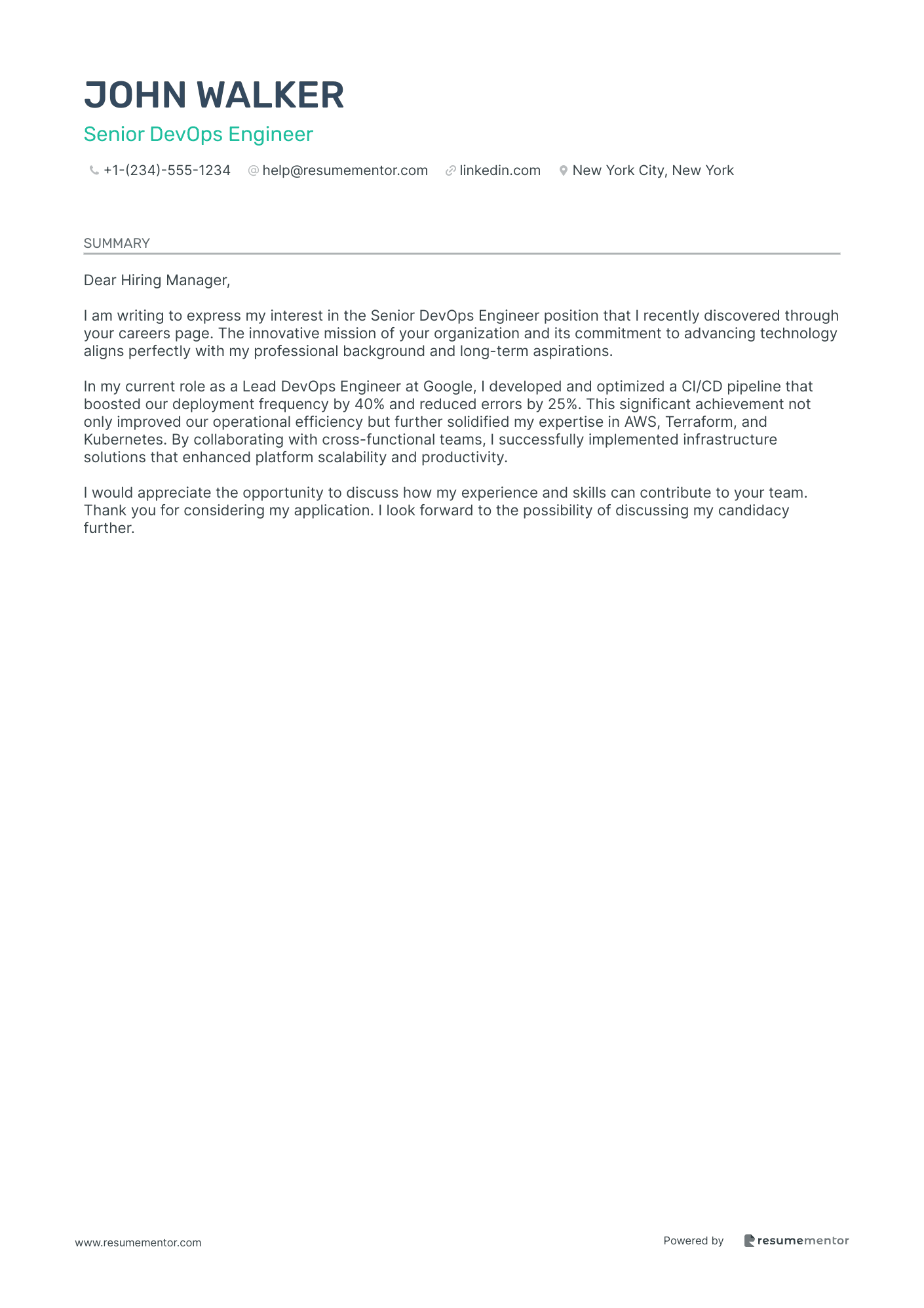
Senior DevOps Engineer
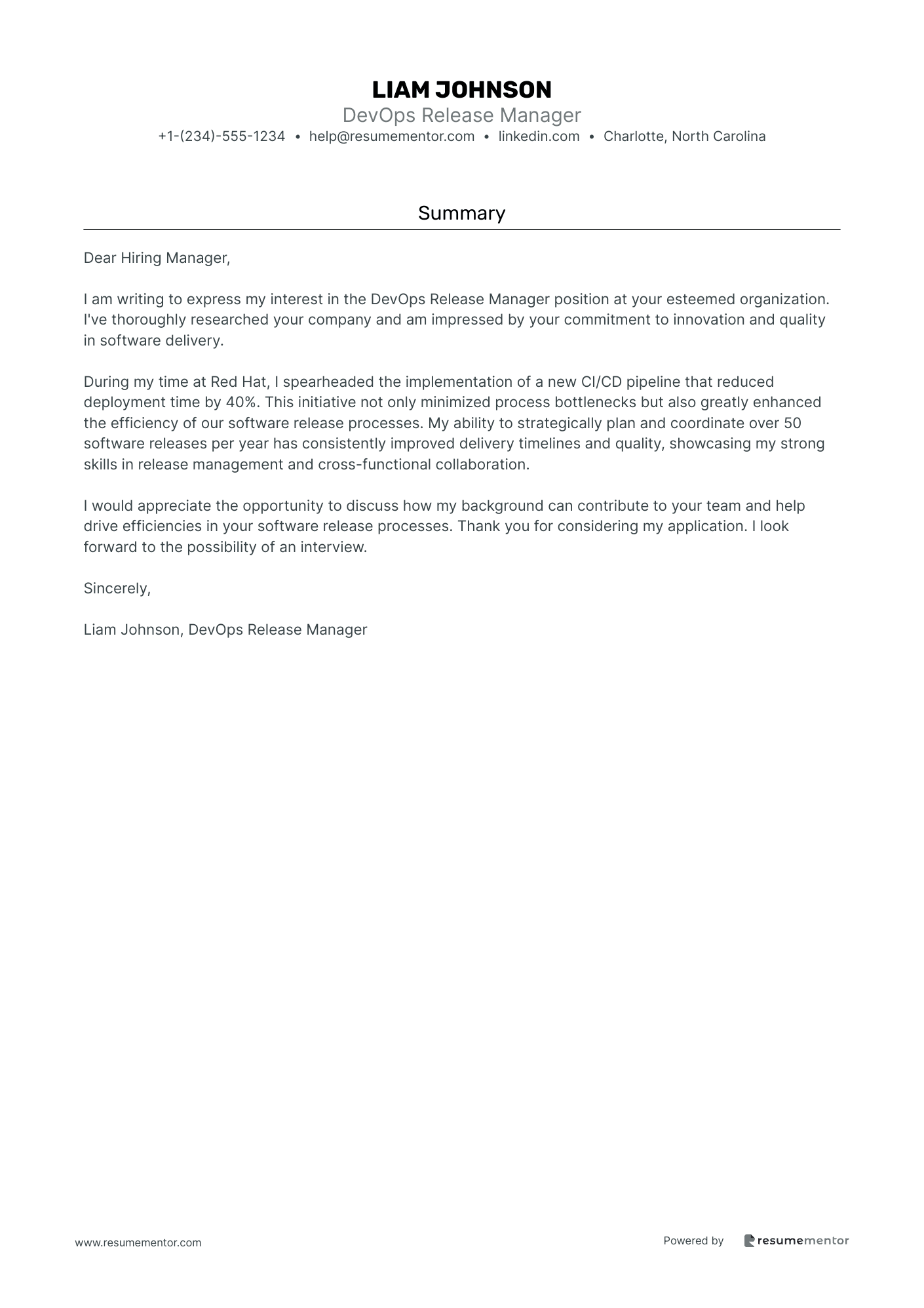
DevOps Release Manager
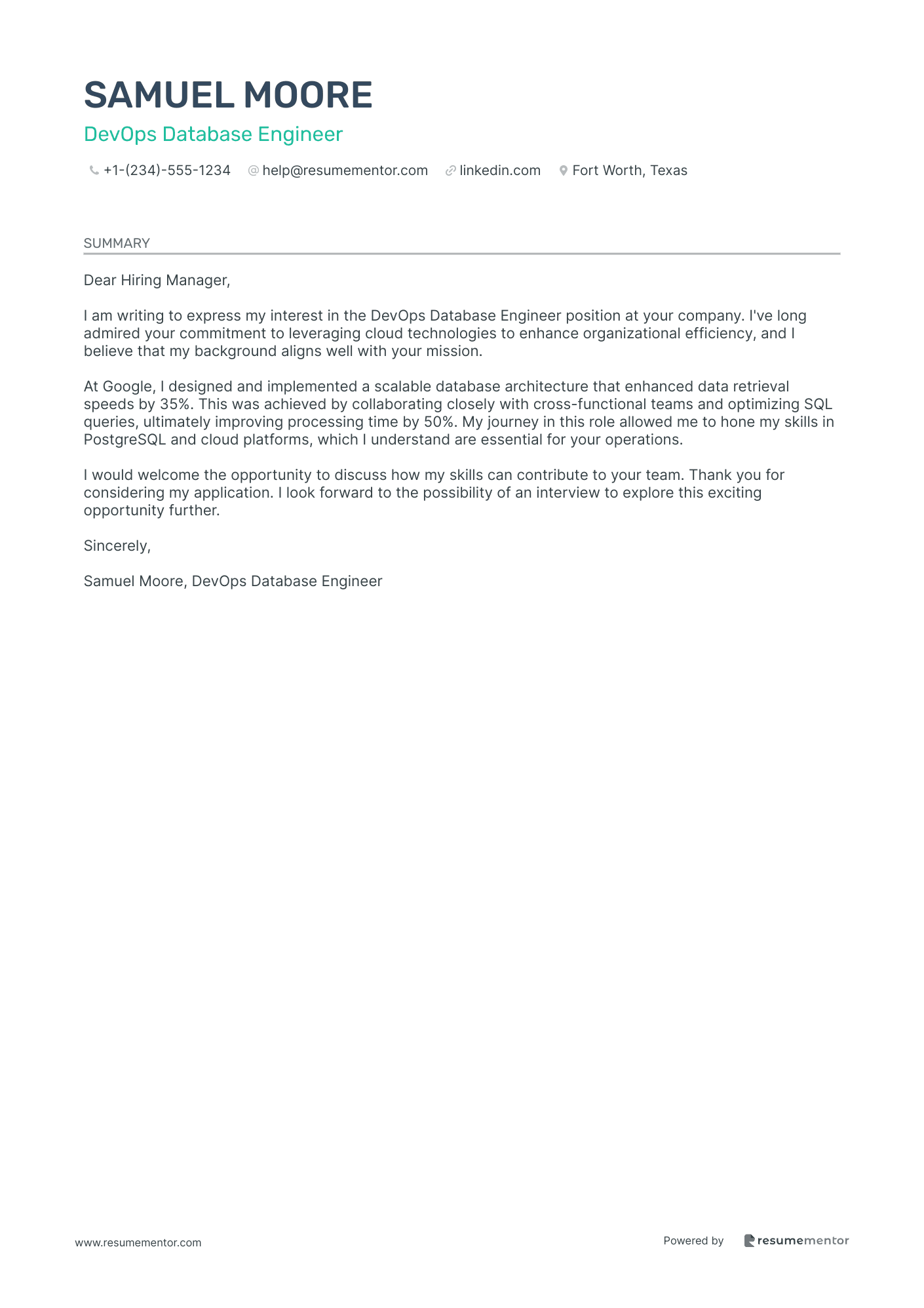
DevOps Database Engineer
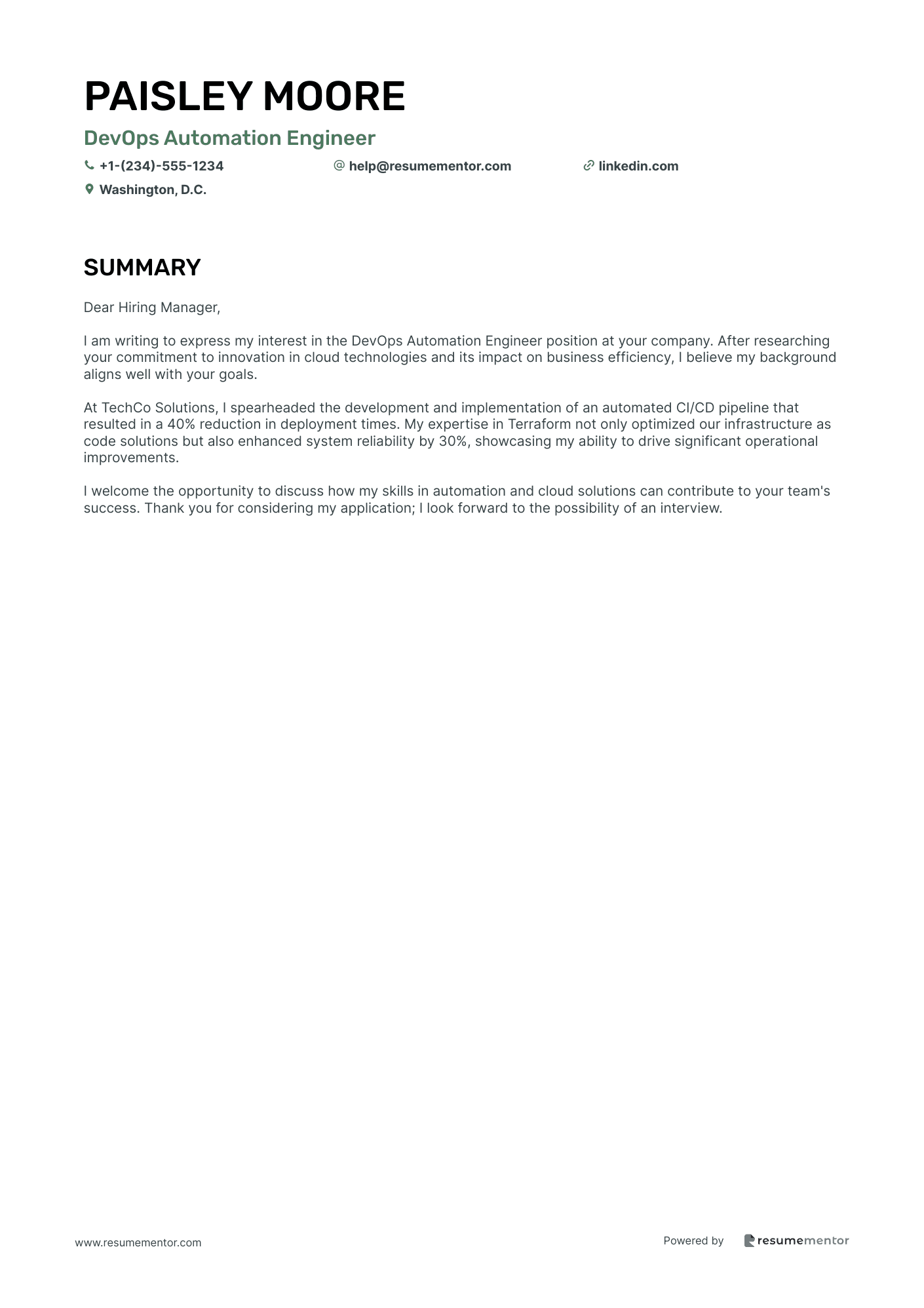
DevOps Automation Engineer
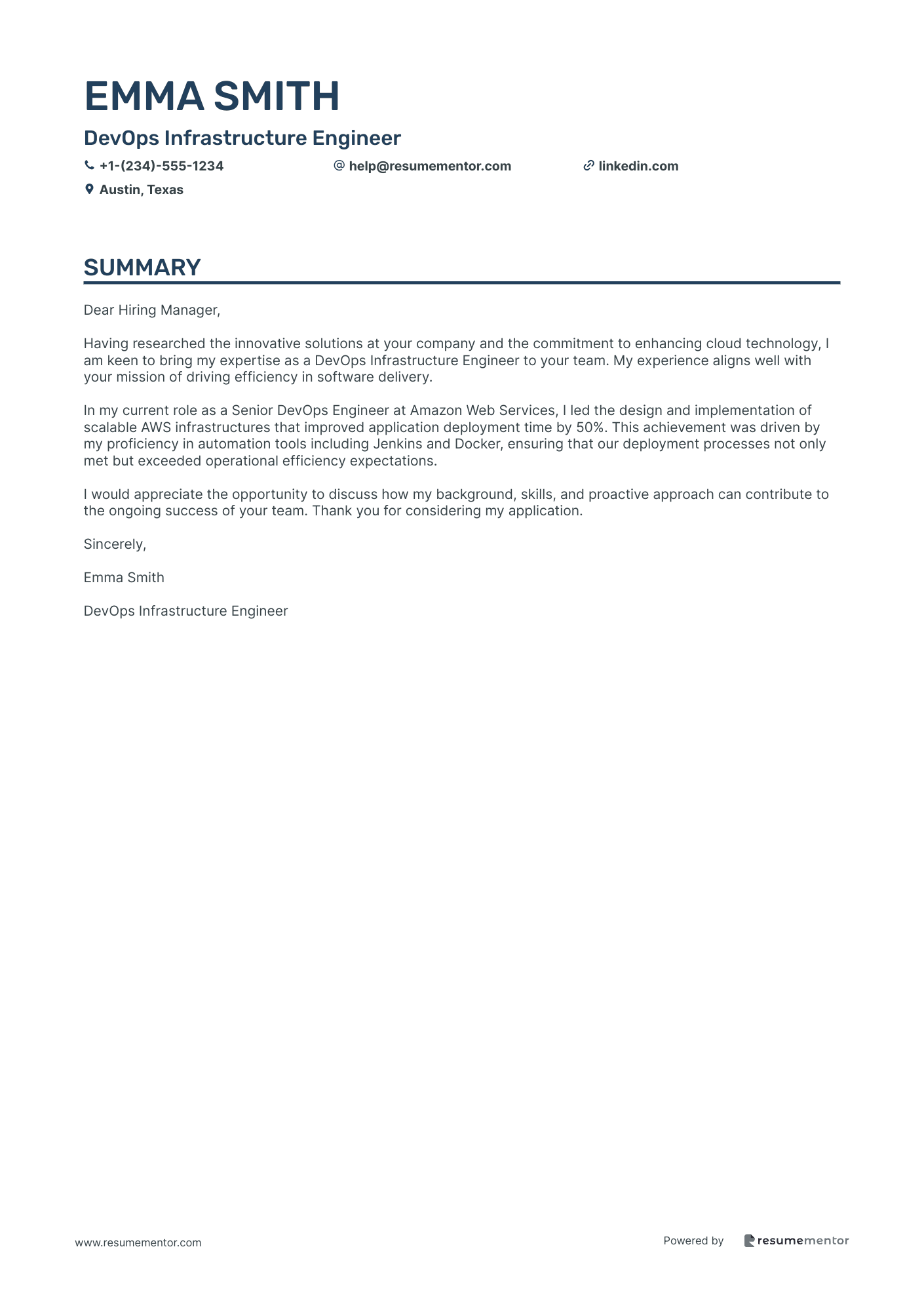
DevOps Infrastructure Engineer

DevOps Security Engineer cover letter sample
When applying for this position, it’s important to showcase your experience with cloud platforms like AWS, Azure, or GCP. Highlight your familiarity with security frameworks such as NIST or ISO 27001. Mention any certifications, like Certified Information Systems Security Professional (CISSP) or Certified Ethical Hacker (CEH), to demonstrate your commitment to security practices. Provide specific examples of how you've implemented security measures that resulted in reduced vulnerabilities or compliance with regulatory standards. Use a 'situation-task-action-result' approach to detail your contributions effectively.
Summary
Dear Hiring Manager,
I am writing to express my interest in the DevOps Security Engineer position. I have been following your company’s innovative approaches to DevOps and security, and I am particularly impressed by your commitment to enhancing cloud security solutions.
During my tenure at Red Hat as a DevOps Security Engineer, I led a team that successfully reduced security vulnerabilities by 60% through the implementation of automated security tools and comprehensive training workshops. This achievement not only enhanced our security posture but also fostered a culture of continuous improvement within the team, proving my ability to drive change and enhance collaboration in technical environments.
I would welcome the opportunity to further discuss how my proven track record in security and cloud computing aligns with the goals of your team. Thank you for considering my application; I look forward to the possibility of contributing to your organization’s success.
Sincerely,
Ella White
DevOps Security Engineer
DevOps Architect cover letter sample
When crafting your cover letter, emphasize any experience with cloud platforms like AWS, Azure, or Google Cloud. Highlight your expertise in CI/CD pipelines, as these are essential for streamlining operations. Mention any relevant certifications, such as those in Kubernetes or Docker, to demonstrate your technical skills. Provide specific examples of how your automation efforts have reduced deployment times or improved system reliability, using a clear 'skill-action-result' format. Illustrating your ability to bridge development and operations will make your application stand out.
Summary
Dear Hiring Manager,
I am writing to express my interest in the DevOps Architect position at your company. I am impressed by your commitment to innovation and excellence in the tech industry, particularly your focus on leveraging cloud technologies for transformative solutions.
In my role as a Senior DevOps Engineer at IBM, I led the design and implementation of cloud-based infrastructure that improved scalability by 75% while reducing operational costs by 30%. This achievement not only enhanced our deployment processes but also significantly contributed to driving efficiency across multiple teams, demonstrating my capability to harness cloud technologies and CI/CD pipelines effectively.
I would welcome the opportunity to discuss how my background and skills can contribute to your team's success. Thank you for considering my application; I look forward to the possibility of contributing to your esteemed organization.
Sincerely,
Chloe Martinez DevOps Architect
DevOps Software Engineer cover letter sample
When writing your cover letter, emphasize any experience with cloud platforms like AWS, Azure, or Google Cloud. Highlight your proficiency in automation tools such as Ansible or Terraform, which streamline processes. Mention any coding skills in languages like Python or Shell scripting that aid in system management. Include examples of how you've improved deployment speed or reduced system downtime, using metrics to showcase your impact. Lastly, discuss your collaboration with development and operations teams to ensure smooth integration, which highlights your ability to foster teamwork.
Madison Taylor
DevOps Software Engineer
Summary
Dear Hiring Manager,
As a driven DevOps Software Engineer with extensive experience at leading tech firms, I’ve closely followed Google Cloud's innovative strategies in cloud computing. The company's commitment to enhancing operational efficiency and scalability resonates with my professional ethos and career aspirations.
At Google Cloud, I successfully led the development of an automated CI/CD pipeline that reduced deployment times by 30%, directly contributing to enhanced software reliability and increased system scalability by 25% through effective Kubernetes orchestration. This achievement demonstrates my ability to streamline processes, improve performance, and foster collaboration across cross-functional teams, making substantial impacts on application uptime and operational costs.
I look forward to the opportunity to discuss how my background in AWS and Terraform can contribute to the continued success of your team. Thank you for considering my application; I hope to discuss this exciting opportunity with you soon.
DevOps Systems Engineer cover letter sample
When crafting your cover letter, focus on your experience with cloud platforms like AWS or Azure. Highlight your proficiency in automation tools such as Terraform or Ansible. Mention any relevant certifications, like AWS Certified Solutions Architect or Docker Certified Associate, to demonstrate your commitment. Provide specific examples of how your skills improved deployment times or reduced system downtime in previous roles. Use a 'situation-task-action-result' structure to clearly illustrate your contributions and their positive impacts on team efficiency and project success.
Abigail Hall
DevOps Systems Engineer
Summary
Dear Hiring Manager,
I was drawn to the DevOps Systems Engineer position at your company because of your commitment to innovative cloud solutions and the significant impact you have on the industry. Having followed your projects on cloud architecture, I am eager to contribute my expertise to enhance your team's success.
In my role at Amazon Web Services, I led a cross-functional team to design and deploy CI/CD pipelines that reduced deployment time by 35%, thereby improving overall developer efficiency. This achievement not only illustrates my strong proficiency in automation and DevOps methodologies but also underscores my ability to drive substantial performance improvements within a team-oriented environment.
I invite you to discuss how my background in cloud infrastructure and my track record in optimizing deployment processes can add value to your organization. Thank you for considering my application, and I look forward to the opportunity to speak with you soon.
Senior DevOps Engineer cover letter sample
When applying, highlight your experience with cloud platforms and automation tools. Emphasize your ability to implement CI/CD pipelines and manage infrastructure as code. Mention any certifications like AWS Solutions Architect or Kubernetes Administrator, along with the duration of your experience for credibility. Showcase specific examples where you've improved deployment times or system reliability, using a 'skill-action-result' format. It's also beneficial to note your collaborative efforts with development teams to enhance workflows, demonstrating your impact on overall project success.
John Walker
Senior DevOps Engineer
Summary
Dear Hiring Manager,
I am writing to express my interest in the Senior DevOps Engineer position that I recently discovered through your careers page. The innovative mission of your organization and its commitment to advancing technology aligns perfectly with my professional background and long-term aspirations.
In my current role as a Lead DevOps Engineer at Google, I developed and optimized a CI/CD pipeline that boosted our deployment frequency by 40% and reduced errors by 25%. This significant achievement not only improved our operational efficiency but further solidified my expertise in AWS, Terraform, and Kubernetes. By collaborating with cross-functional teams, I successfully implemented infrastructure solutions that enhanced platform scalability and productivity.
I would appreciate the opportunity to discuss how my experience and skills can contribute to your team. Thank you for considering my application. I look forward to the possibility of discussing my candidacy further.
DevOps Release Manager cover letter sample
When applying for this position, it’s important to showcase any experience with continuous integration and delivery (CI/CD) tools. Highlight your familiarity with cloud platforms and orchestration tools like Kubernetes or Docker. Mention any relevant certifications, such as AWS Certified DevOps Engineer or Azure DevOps Solutions Expert, to add credibility. Focus on your ability to troubleshoot issues quickly and implement solutions that improve deployment processes. Use specific examples to show how your contributions led to increased efficiency or reduced downtime in past projects.
Liam Johnson
DevOps Release Manager
Summary
Dear Hiring Manager,
I am writing to express my interest in the DevOps Release Manager position at your esteemed organization. I've thoroughly researched your company and am impressed by your commitment to innovation and quality in software delivery.
During my time at Red Hat, I spearheaded the implementation of a new CI/CD pipeline that reduced deployment time by 40%. This initiative not only minimized process bottlenecks but also greatly enhanced the efficiency of our software release processes. My ability to strategically plan and coordinate over 50 software releases per year has consistently improved delivery timelines and quality, showcasing my strong skills in release management and cross-functional collaboration.
I would appreciate the opportunity to discuss how my background can contribute to your team and help drive efficiencies in your software release processes. Thank you for considering my application. I look forward to the possibility of an interview.
Sincerely,
Liam Johnson, DevOps Release Manager
DevOps Database Engineer cover letter sample
When applying for this position, it’s important to highlight your experience with database management and cloud technologies. Emphasize any familiarity with tools like Docker, Kubernetes, and configuration management systems. Include certifications such as AWS Certified Solutions Architect or Microsoft Azure Database Administrator. Be specific about projects where you automated database backups or improved deployment efficiency. Use a 'skill-action-result' approach to showcase how your contributions led to better system performance or reduced downtime in previous roles.
Samuel Moore
DevOps Database Engineer
Summary
Dear Hiring Manager,
I am writing to express my interest in the DevOps Database Engineer position at your company. I've long admired your commitment to leveraging cloud technologies to enhance organizational efficiency, and I believe that my background aligns well with your mission.
At Google, I designed and implemented a scalable database architecture that enhanced data retrieval speeds by 35%. This was achieved by collaborating closely with cross-functional teams and optimizing SQL queries, ultimately improving processing time by 50%. My journey in this role allowed me to hone my skills in PostgreSQL and cloud platforms, which I understand are essential for your operations.
I would welcome the opportunity to discuss how my skills can contribute to your team. Thank you for considering my application. I look forward to the possibility of an interview to explore this exciting opportunity further.
Sincerely,
Samuel Moore, DevOps Database Engineer
DevOps Automation Engineer cover letter sample
Highlight your experience with automation tools like Jenkins, Ansible, or Chef. Detail your familiarity with cloud platforms such as AWS or Azure. It’s important to illustrate how you have improved deployment processes and increased efficiency in previous roles. Mention any relevant certifications like AWS Certified DevOps Engineer or a similar qualification. Use specific examples to showcase your troubleshooting and monitoring skills, explaining how your contributions led to reduced downtime or accelerated product delivery. This will demonstrate your value and drive effective results.
Paisley Moore
DevOps Automation Engineer
Summary
Dear Hiring Manager,
I am writing to express my interest in the DevOps Automation Engineer position at your company. After researching your commitment to innovation in cloud technologies and its impact on business efficiency, I believe my background aligns well with your goals.
At TechCo Solutions, I spearheaded the development and implementation of an automated CI/CD pipeline that resulted in a 40% reduction in deployment times. My expertise in Terraform not only optimized our infrastructure as code solutions but also enhanced system reliability by 30%, showcasing my ability to drive significant operational improvements.
I welcome the opportunity to discuss how my skills in automation and cloud solutions can contribute to your team's success. Thank you for considering my application; I look forward to the possibility of an interview.
DevOps Infrastructure Engineer cover letter sample
When applying for this role, highlight your experience with cloud platforms like AWS, Azure, or Google Cloud. Detail your familiarity with CI/CD tools, such as Jenkins or GitLab, to demonstrate your ability to automate processes. Mention any certifications, like AWS Certified Solutions Architect, to show your technical expertise. Use specific examples to illustrate how you improved system uptime or reduced deployment times, following a 'skill-action-result' approach. Emphasize your teamwork experiences in cross-functional environments to show your collaborative skills.
Emma Smith
DevOps Infrastructure Engineer
Summary
Dear Hiring Manager,
Having researched the innovative solutions at your company and the commitment to enhancing cloud technology, I am keen to bring my expertise as a DevOps Infrastructure Engineer to your team. My experience aligns well with your mission of driving efficiency in software delivery.
In my current role as a Senior DevOps Engineer at Amazon Web Services, I led the design and implementation of scalable AWS infrastructures that improved application deployment time by 50%. This achievement was driven by my proficiency in automation tools including Jenkins and Docker, ensuring that our deployment processes not only met but exceeded operational efficiency expectations.
I would appreciate the opportunity to discuss how my background, skills, and proactive approach can contribute to the ongoing success of your team. Thank you for considering my application.
Sincerely,
Emma Smith
DevOps Infrastructure Engineer
Related Articles

Continue Reading
Check more recommended readings to get the job of your dreams.
Resume
Resources
Tools
© 2026. All rights reserved.
Made with love by people who care.
